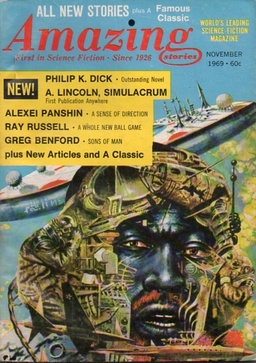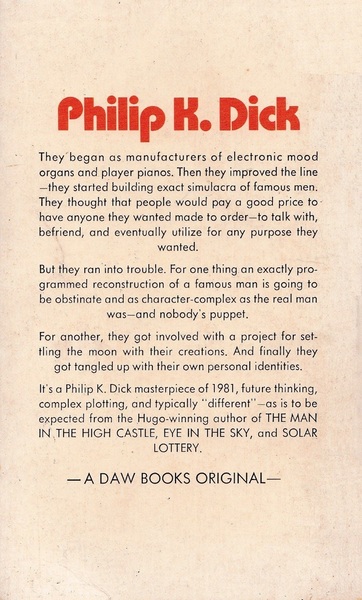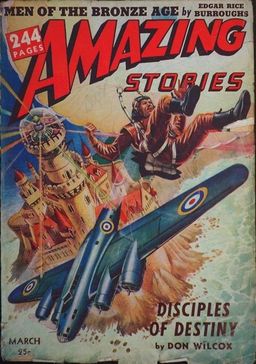Amazing Stories November 1969: A Retro-Review
 This is Part 1 of a Decadal Review of vintage science fiction magazines published in November 1969. The articles are:
This is Part 1 of a Decadal Review of vintage science fiction magazines published in November 1969. The articles are:
Amazing Stories, November 1969
Galaxy Science Fiction, November 1969
The Magazine of Fantasy & Science Fiction, November 1969
Worlds of If, November 1969
Analog Science Fiction/Science Fact, November 1969
Almost every year I go to a small sci-fi conference in Lawrence Kansas called The Campbell Conference. The people who run the Campbell Conference have a lot of sci-fi magazines and books; boxes and boxes of them. In fact, they have them out in the common area and sell them for like a dollar apiece. I was there last year and pulled out, completely at random, an Amazing Stories from November 1969 — which is remarkable because that was the year and month I was born.
And it occurred to me that, truth be told, I actually haven’t read all that much science-fiction. I read a Larry Niven short story collection in high school, and The Science Fiction Hall of Fame, Volume 1 off and on in early college. The majority of my science fiction reading has been novels; I didn’t really return to the short-form until the early 2000’s — and mostly because that’s when I first started going to the Campbell Conference!
When I saw that ’69 Amazing I was struck with the idea that I’d raid those boxes, gather the magazines from November ’69, read ‘em, and review ‘em. Then, because a decade is a nice number, I figured that I’d add ’79, ’89, and ’99, possibly (depending on how this all goes over) I may do ’09. Yes, a Quatro-Decadal Review!
I’m going to delve fairly deep into these works, so if you’ve got an issue with spoilers for 47 year old stories, you have fair warning! Also, I’m gonna end the reviews with my thoughts on the general ‘vibe’ of the magazine.
And away we go!
Amazing Stories, November 1969
Editorial
I work on editorials all the time for Heroic Fantasy Quarterly, and I often feel a bit conflicted that I sometimes plug my own work in them. I was glad to see that the practice had a long and glorious history behind it, with Ted White’s editorial name-dropping and talking about the various books/stories he’s written.
“A. Lincoln, Simulacrum- Part 1”, by Phillip K. Dick
So… PKD is one of those guys who doesn’t know how anything works. To his credit, he does not allow this to stop him. “A.L.S.” is typical of what (little) I’ve ready of PKD: A scam to sell electric organs turns into scheme to build robots to re-fight civil war battles, which (naturally) requires building an Edwin M. M Stanton (Lincoln’s Secretary of War) simulacrum as a proof-of-concept before building an Abe Lincoln simulacrum, which puts the Rosen Spinet and Electric Organ Company in the red, which necessitates the assistance of rich asshole Sam K. Barrows, who is himself in the red because his land-grab speculations on the moon aren’t panning out. They aren’t panning out because nobody in their right goddamn minds wants to be in that first wave of lunar settlers*. So Barrows wants simulacra — which nobody is supposed to know are simulacra — to compose the lion’s share of the first wave of colonization to attract other people.
 |
 |
It is clear that “A.L.S.” is a run-through for Do Androids Dream of Electric Sheep. It was later published in book form as We Can Build You. The story is slow, goofy (those mood affecting Hammerstein organs? The ones that affect the thalamus? Not gonna talk about them again after page 6) kinda sexist, and can’t go more than a page without PKD Louis (the MC) psycho-analyzing something, often himself, but more often his business partner’s young daughter, Pris.
Although Pris is in the movie Blade Runner, I don’t recall her being a character in Electric Sheep. I can promise you that someone working on Blade Runner must have read the following scene because they make Darryl Hannah look just like this in the movie:
I saw a little hard, heart-shaped face, with a widow’s crown, black hair, and due to her odd make-up, eyes outlined in lack, a Harlequin effect, and almost purple lipstick; the whole color scheme made her appear unreal and doll like, lost somewhere back behind the mask which she had created out of her face. And the skinniness of her body put the capper on the effect: she looked to me like a dance of death creation animated in some weird way […]
As I plowed through it, my first thought was that the story was worthwhile only in that it was kind of a shakedown trip for Electric Sheep. And yet… and yet… I remember reading somewhere, I think it was Tor.com’s Lovecraft Reread, that after a while all of the adverbs and archaic language simply overwhelm you and, Stockholm syndrome like, you start to just go with it. That’s what “A.L.S.” is like. The stupid schemes built upon stupid schemes, generating more stupid schemes, the manic pixie dream girl, the idea that you’d build two historically accurate simulacra (one of which you’d just let take a bus to Seattle and disappear), the endless psychoanalyzing; It starts to take you in a bit. Sadly you have to get about 80% through the story for this to happen.
Darryl Hannah as Pris in Blade Runner
Hell, now I’m invested and I have to see how it ends!
(*This part I agree with.)
“Sons of Man” by Greg Benford
The narrative is split between two characters, Rich jerk Raymond King, wounded in the snow by burns that seem like cuts, being rescued by a good-hearted lumberjack, and Terrance Wilk, an astronaut working on a crashed alien ship that has been discovered on the moon.
King has been looking for mythical monsters (what we’d call cryptozoology these days), and actually managed to track a group of bigfoots, however, they end up shooting him with their high-tech laser. Wilk, on the other hand, is trying to get the (barely) working parts of the alien ship to yield information about who built it and what it was for. King and the lumberjack are hounded by the bigfoots, and Wilk is saddled with two crewmembers who are members of a charismatic Christian cult called the New Sons of God. Turns out that, 100,000 years ago or so, the aliens had attempted to make a slave race out of the apes on earth, sometime before homo sapiens evolved, and the bigfoots are the descendants of those apes. They have bits and pieces of the alien technology, which they use and worship.
The story is actually pretty good, especially the Wilk side of it — he’s in this giant derelict ship that they’ve just managed to get power to one section and they are very carefully exploring it. Wilk is also black (African, fwiw, not African Amerian. AND he gets the magazine cover!). The New Sons thing is a bit weak, with a rough explanation of needing to get various religious organizations involved so there is enough funding for the research mission. The story is set in early 1999 and it is interesting the view of the future:
Half a year ago a scouting party found the ship about five hundred kilometers from Calvius Center. The news produced spectacular response from all the governments of the world, awe in the mind of the average man and deep suspicion in the religious cults that were growing of late. […] As much of a scientific expedition as could be mustered, considering the low funding for science in the face of the famine and pollution problems, was dispatched.
“A Sense of Direction” by Alexei Panshin
This story takes place in the World of Ships series, in which “the seven ships that two hundred years before had carried away over a hundred survival colonies from an over-populated Earth on the trebling edge of a final war.” Hundreds of years have passed, and the ships travel among the colonies, ostensibly spreading knowledge and information to the struggling colonies. Young Arpad Margolin, a half-colonist, half shippee, is adopted at 12 onto his father’ ship and absolutely hates it. The feeling seems pretty mutual. The Ships have a rite of adulthood that involves staying out on a planet for a month, and Arpad can’t even wait for that- he sneaks off on one of the survival training tips.
This is an interesting story, the conflicting worldviews of Arpad and the people of the Ship are well done, as is Arpad’s conflicting worldview with the people of the Planet Aurora. The Aurorans are struggling along, and have a bizarre system of debts and obligations going back generations — all the way to the Great Ship that brought them. They keep their names secret because one only offers one’s name if one is willing to admit to one’s debts or is asking for one’s obligations. Arpad gets adopted into a family and things seem to be going great, except that the family also has an old man who, because they’ve now adopted Arpad, has to be gotten rid of. Buried alive, it would seem.
The story got off to a great start, and things were quite interesting, but it really ended weakly for me, with Arpad going back to the training camp and life on the ship… I guess to prove himself to them? Or maybe the strangeness of the Aurorans has made him realize how strange he must be to the Shippees — which would work if Panshin had shown Arpad having very different traditions and views than his Shipmates, which he did not.
In spite of the weak ending, I hope I stumble across a few more of the Great Ship stories in the Quadro-Decadal Retro Read.
“A Whole New Ball Game” by Ray Russell
This is a short piece, a good one. Written in first-person as a letter, the story deals in an indeterminate future, organ transplants are possible BUT there is a shortage of donors. And, as the story notes when Hare is confessing to his priest:
This is the modern world i tell him, you half to get used to it just like i had to get used to not calling you father & all that. It’s a whole new ball game Billy, i tell him. It’s what Maggie calls the law of supply & demand. But Billy he don’t say anything & i can tell he feels awful. Some times i feel sorry for that young fella, he is just eating his heart out, he cant tell no body not even his wife & kids.
The fact that the guy murders people for their organs, and is considering murdering his partner before his partner murders him, and yet he feels bad enough about it all to confess to priest — or an ex-priest, it seems that priests, maybe religion in general, is outlawed or somesuch — is deftly handled. A fun quick read.
Column: The Science of Science Fiction, by Greg Benford and David Book
This is a ‘new’ column fovvvvvvvr the magazine, but whether this is the first of the run, or still early enough in the run to keep the ‘new’ in the blurb, I don’t know. The subject is how to detect planets, using the history/science of earth-bound planetary discovery and transitioning it a bit to how a spaceship or probe in an alien solar system might do it. It is a very good article, talking about the different detection methods (direct observation, mathematical evaluation of exiting planetary perturbations, observation from non-visible-light radiation). It would pair nicely with William Ledbetter’s “Exoplanet Hunters.”
Column: The Clubhouse by John D. Berry
Although I’m judging from only one article, “The Clubhouse” is concerned with the strange ways of fandom — with this one being about the ways of fan ‘zines. And man, was fandom going great guns in 1969! Multiple well-established ‘zines are covered as are some new publications, and a page of really-new publications. Getcher mimeographed ‘zines while they’re still damp!* Of note, there is one ‘zine directly related to Star Trek “Star Trek Concordance”.
I found it especially interesting that there is a mention of the slow emergence of other, non sci-fi, fandoms; something that, like fusion power, always seems about 10 years away!
*is there anyone under 40 who even gets that?
Column: Future in Books, Various Authors
They hit Lee Hoffman’s “The Caves of Karst”, Norman Spinrad’s “Bug Jack Barron”, A.E. Van Vogt “The Far-Out Worlds of A.E. Van Vogt”. Some highlights:
“The Caves of Karst” “What Lee Hoffman [has done] is perhaps deceptive, but not at all simple. Writing in a spare, tough prose, she is the first woman sf writer to make valuable use of the Chandler/Hammett school of writing since Leigh Brackett. [..] Like Miss Brackett, Miss Hoffman writes from outside any consideration of her own gender: she is writing a hard-nosed story about hard-nosed people, and she doesn’t give you time to surface and recall that the author is female.”
“Bug Jack Barron” “Spinrad creates his characters as if he was using an instruction sheet, creating habits and actions that, even a the time of set-up, are obvious ploys for later story use. His women especially are unappealing and unconvincing, and his style encompasses what seems to be distaste for (or mindlessly ignorant use of ) females.”
“The Far-Out Worlds of A.E. Van Vogt” “Out of twelve stories less than half are passable and only one better than that. […] The best, “The First Martian”, has some of the choicest characterizations of the author’s career, a runaway train on the Martian desert, and an interesting pivot of ecological adaptation. It’s simple, slick, suspenseful, and a good bit of fun.”
Letters Column: Or So You Say
Ah, the letters! The tilting of the champions of the different factions of fandom. Of note is a letter from Darrell Schweitzer, congratulation Amazing on finally having an editor “[…] who cares about the magazine and seeks to improve it, drenching it in his personality (and thus distinguishing it from a periodical anthology.”

“Sarker’s Joke Box” by Raymond Z. Gallun
At first, I thought that this last story of the issue was a bit of a tip of the hat to the pulp sci-fi of the 30s, but it turns out it was a “Classic Reprint” from the March, 1942 Amazing. Even back then I’m not sure that it might not have been a little tongue-in-cheek.
Space copper Slade Herrodd corners interplanetary criminal Clary Starker in Starker’s cave hideout in the Ozarks, hoping to delay him long enough for the interplanetary Police force to arrive and capture him. Sarker gives them the slip, hiding in a giant metal pod, sealing himself in. The cops find the mysterious pod to be indestructible; turns out it is made of neutronium. Sarker’s crooked lawyer shows up, reminds everyone that while they have legally captured Sarker, but if he isn’t brought to trial in 60 days he goes free.
The cops set up an experimental cutting wheel, but it doesn’t get through until day 60. Turns out Sarker forgot that, being impervious to energy on the outside, the pod is also impervious to energy on the inside and he cooks slowly for most of his 60 days, before cooking quickly when he tries to cut his way out. Old school fun.
Broad Brush Observations. Environmental issues seem to take a fairly prominent place in this volume of Amazing, what with the ‘pollution’ quote from “Sons of Man” above, the birth defects in “A. L. S”., and even in the letters column:
What I want is a technology that will rid the world of its problems.
I want to live on a world where I can breathe in oxygen, instead of carbon monoxide. I want to be able to see the sky and the stars, not smog. I want to be able to cross a city street without taking my life into my own hands.
I don’t want eight billion neighbors.
What does everyone have against clear streams, virgin forest, golden beaches and the oceans with surf?
If people are getting sick of reading about oil slicks and conservation problems, why aren’t they pressuring our government to do something about it?
The near-future was bright for our anonymous letter writer. Here is what the U.S. of A. did about those problems:
The Clean Water Act passed, 1972
The Clean Air Act passed, 1970
Resource Conservation and Recovery Action (Hazardous Waste Regulation) passed, 1976
Nuclear Regulatory Commission created, 1975
Endangered Species Act passed, 1973
Toxic Substances Control Act (regulates commercial chemicals (like PCBs)) passed, 1976
To hell with it, I’m going to go there — that’s what we did in the goddamn 70s (under goddamn Nixon and, after he resigned in goddamn disgrace, goddamn Ford) and now? In the goddamn late 20-teens?
May 22, 2017 President Trump’s proposed budget would cut the EPA by over 30%.
June 1, 2017 President Trump withdraws from Paris Climate Accord.
Adrian Simmons is an editor for Heroic Fantasy Quarterly. His last article for us was Military Androids, Space Zombies, and the Business of Time Travel: A Review of the March/April 2017 Analog.

[…] Fiction (Black Gate) Amazing Stories November 1969: A Retro-Review — “It is clear that ‘A.L.S.’ is a run-through for Do Androids Dream of […]
[…] Fiction (Black Gate) Amazing Stories November 1969: A Retro-Review — “It is clear that ‘A.L.S.’ is a run-through for Do Androids Dream of […]